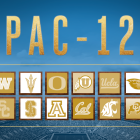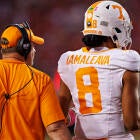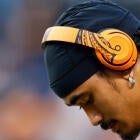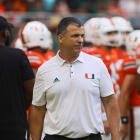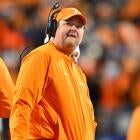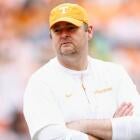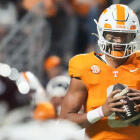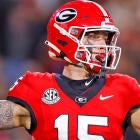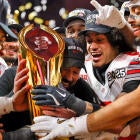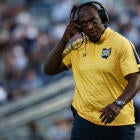The Pac-12 calls itself the "Conference of Champions," which is very true when it comes to dominating Olympic sports. It hasn't been the case much in football lately, however. The Pac-12 has failed to reach the College Football Playoff in each of the last three seasons and has not had a national champion in football since USC in 2004 (or, if you like to pretend NCAA punishments are real, USC in 2003).
Still, while the conference hasn't had a lot of national success in recent years, it didn't become a Power Five conference by accident. It has a long, rich history of success, and while USC has been the dominant program in the conference (only Princeton, Yale, Alabama and Notre Dame have claimed more national titles), there have been plenty of other great teams.
Who were they? Well, while it wasn't always easy to figure out, I went ahead and found the best team in the history of each Pac-12 program to give you a head start.
| 1998 | |
| Arizona is largely considered a basketball school, as that's where most of its success has been. While the football program has six conference titles in its history, only one has come since it joined the Pac-12 (then the Pac-10) in 1978. That was 1993, but the best Arizona team of all time came a few years later in 1998. That Wildcats team finished the season 12-1 and at No. 4 in the AP Top 25 poll, its highest finish in history. Unfortunately for the Wildcats, the lone loss that year came in a 52-28 defeat at then No. 3 UCLA. The Bruins would finish undefeated in Pac-12 play and earn a Rose Bowl berth. Arizona would have to settle for a Holiday Bowl berth against Nebraska that resulted in a 23-20 win. Arizona's 12 wins in 1998 remain the most the school has achieved in a single season, a full two wins more than either the 1993 or 2014 teams were able to accomplish. | |
| 1996 | |
| The Sun Devils have two unclaimed national titles stemming from the 1970 and 1975 teams that were then playing in the WAC, and while I considered both, I think 1996 is the better choice. Bruce Snyder's team went 11-1 that year, including 8-0 in Pac-10 play. One of their wins was a 19-0 shutout against No. 1 and defending champion Nebraska in September. The lone loss was a 20-17 loss to No. 4 Ohio State in the Rose Bowl. The 1996 team featured some of the best players in program history, including QB Jake Plummer and defensive back Pat Tillman. | |
| 1937 | |
| Cal has produced a lot of great talent over the years and had Aaron Rodgers and Marshawn Lynch on the same team in 2010. The problem is that Cal's collection of talent hasn't resulted in a lot of success, because even that 2004 team with Rodgers and Lynch managed to lose twice. So, in the end, I chose to go with the last Cal team to win a national title and finish a season undefeated. The Thunder Team of 1937 went 10-0-1 and shutout seven opponents along the way, outscoring them 214-33. Even their tie was a scoreless affair against Washington, and the Bears finished the year with a 13-0 win over No. 4 Alabama in the Rose Bowl. It was the team's fourth consecutive shutout to finish the season. | |
| 1990 | |
| The 1990 season was a wild year that saw four schools claim national titles. The Buffaloes were one of them (as did fellow Pac-12 school Washington, though Colorado was a member of the Big Eight at the time), and it remains the lone national title in program history. The Buffs finished the season No. 1 in the AP Top 25 poll after going 11-1-1 on the season. The lone loss was a close 23-22 loss on the road at No. 21 Illinois. After that, the Buffs stampeded to 10 straight wins, including victories against five ranked teams (as well as the infamous Fifth Down game against Missouri). Colorado beat No. 3 Nebraska 27-12 in Lincoln and then finished the season with a 10-9 win over No. 5 Notre Dame in the Orange Bowl. The best player on the team was running back Eric Bieniemy, who was one of eight NFL Draft picks on the roster. | |
| 2012 | |
| Oregon played for a national title in both 2010 and 2014, losing both times. I considered those teams for this honor, but the 2012 team is the one that truly stands out. The team didn't even win the Pac-12 North, but it was a fantastic team. It picked up five wins against ranked teams, but its lone loss came in overtime to Stanford, 17-14. That game served as the divisional tiebreaker, and if not for that, it's safe to say the Ducks would have been playing for a national title in 2012 as well. Instead, they had to settle for a 35-17 win over No. 7 Kansas State in the Fiesta Bowl and the No. 2 spot in the AP Top 25 poll. This is a team that was never ranked lower than fifth all season. It had an incredible collection of talent and speed and was led by a freshman QB named Marcus Mariota who would go on to win the Heisman Trophy a few years later. | |
| 2000 | |
| Oregon State isn't a program with a rich tradition of success, so the 2000 team stands out even more. This is the team responsible for the Beavers lone conference title since joining the Pac-12 in 1964. Of course, even the year Oregon State won a conference title, it had to share it with two others in Washington and Oregon, as they all finished 7-1 in the conference. The Beavers lost to Washington by three points after missing a 45-yard FG attempt in the final seconds that could have sent the game to overtime. Washington went on to the Rose Bowl and the Beavers went to the Fiesta Bowl where they obliterated No. 10 Notre Dame 41-9. It was Oregon State's fourth win over a ranked team, and third over a top 10 team that season. | |
| 2010 | |
| Stanford won national titles in 1926 and 1940, but no offense to those teams, they couldn't hold a candle to the 2010 Cardinal. If only the 2010 Cardinal hadn't had to deal with a juggernaut Oregon team. On Oct. 2, Stanford went to Autzen Stadium and was routed 52-31. It was the only blemish on the resume of a team led by eventual No. 1 pick Andrew Luck. The team was coached by Jim Harbaugh, who would go on to coach the 49ers, and its defensive coordinator was Vic Fangio, who now coaches the Broncos. Then there was offensive coordinator David Shaw, who replaced Harbaugh and has been a target of NFL teams ever since. On the roster were other NFL stars like Richard Sherman, Zach Ertz and Doug Baldwin. This was a great team, and that's what made the result against Oregon all the crazier. The Cardinal jumped out to a 21-0 lead in the first quarter, only to get outscored 52-10 the rest of the way. They finished the season by pounding Virginia Tech 40-12 in the Orange Bowl. | |
| 1954 | |
| The 1954 team was a victim of circumstance. UCLA went 9-0 on the season, outscoring opponents 367-40, meaning they won games by an average of 36.4 points per game. A stat made all the more ridiculous when you consider one victory was a 21-20 win over Washington. Over the final five games of the season, the Bruins beat Stanford, Oregon State, Cal, Oregon and USC by a combined score of 235-6. But here's where things get truly dumb. Even though UCLA beat USC 34-0 to win the conference, it couldn't play in the Rose Bowl because it played there the previous season. The Rose Bowl had a "no-repeat" rule at the time that didn't allow teams to play in the game in consecutive seasons. So USC went to play Ohio State, which it lost to 20-7. UCLA stayed home, where it then had to split a national title with, you guessed it, Ohio State. The Rose Bowl passed up on a de facto national championship game, and the Bruins finished No. 1 in the Coaches Poll while Ohio State finished atop the AP Top 25 poll. | |
| 1972 | |
| This will be a controversial choice just because there are so many great USC teams to choose from, but while the 2003 and 2004 teams both had legitimate claims (as well as recency bias), the 1972 team is the most deserving. This is a team that ran the proverbial table. It began the year at No. 8 in the AP Top 25 poll, but after opening the season with a 31-10 drubbing of No. 4 Arkansas, it moved to No. 1 and stayed there for the rest of the season. The Trojans picked up five more wins over ranked teams, outscoring opponents by an average of 27.7 points per game. That includes the final three games of the year, which saw the Trojans outscore No. 14 UCLA, No. 10 Notre Dame and No. 3 Ohio State (Rose Bowl) 111-47. | |
| 2004 | |
| This came down to the 2004 and 2008 teams. In the end, I was faced picking between the team that was more dominant throughout the course of the season or the slightly less dominant team that finished the year housing Alabama. I went with the former. No, the 2004 Utah team didn't beat Alabama, but its 12 wins came by an average of 25.8 points per game. The Utes finished their perfect season with 35-7 win over Pitt in the Fiesta Bowl. This is the team that introduced the world to Urban Meyer, as he'd leave for the Florida job after the season. It also featured the No. 1 pick in the NFL Draft in QB Alex Smith. | |
| 1991 | |
| As mentioned in the Colorado blurb, the 1990 Washington team that won a national title had to split it with three other schools. The 1991 team only had to share the honors with Miami! Seriously, though, the 1991 team was easily the greatest in school history. According to College Football Reference's SOS metric, the 1991 Washington team played the eighth-most difficult schedule in the country, but that didn't stop it from going 12-0 and winning its games by an average of 31.6 points per game. Its three wins against top 10 teams (at Nebraska, at Cal and the Rose Bowl against Michigan), came by an average of 14 points. The Huskies defense held seven of their 12 opponents to single digits, and only Nebraska and Washington State managed to reach 20 points. The team had 11 players selected in the 1992 NFL Draft and more in the years that followed. This wasn't just the best team in Washington history, it was one of the all-timers anywhere. | |
| 1997 | |
| Washington State has four conference titles in program history, and while its 1997 winner isn't the most recent (that was the 2002 squad), it was the best team Pullman has ever seen. The Cougars went 10-2 and had to split the conference title with UCLA, but considering the Cougars beat UCLA 37-34 in the season-opener, I don't consider it much of a split. Thankfully that win led to Wazzu reaching its first Rose Bowl in 67 years, though the Cougars would lose to No. 1 Michigan 21-16. The team was led by QB Ryan Leaf who left after the season for the NFL and was the second player taken behind some guy named Peyton Manning. | |
![[object Object] Logo](https://sportshub.cbsistatic.com/i/2020/04/22/e9ceb731-8b3f-4c60-98fe-090ab66a2997/screen-shot-2020-04-22-at-11-04-56-am.png)



















